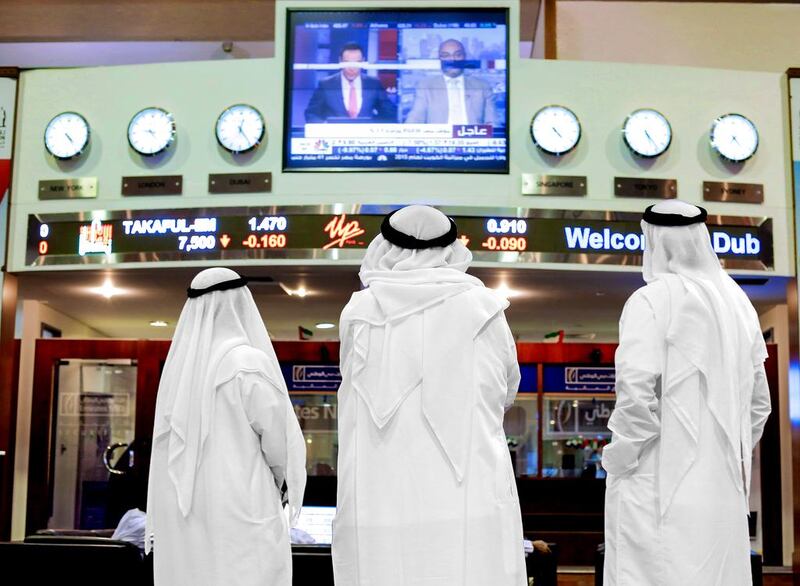Billions of dirhams were wiped off the value of Dubai shares yesterday, as stock markets across the Arabian Gulf lost US$58 billion on a day of calamitous trading.
The sharp sell-offs came in the wake of sliding oil prices and a global equity rout on Friday, spurred by fears of a slowdown in China’s economic expansion, a key engine of global growth.
Dubai's stock market led losses in the Middle East yesterday. The Dubai Financial Market General Index fell as much as 7.2 per cent on the day, before closing down 6.9 per cent at 3,451.48, its lowest level since the end of March.
“There’s been absolutely no discrimination, it’s red across the board,” said Sebastien Henin of the National Investor in Abu Dhabi. “Many stocks are back to their lowest level since December or January.”
Emaar Properties, the heaviest-weighted stock on Dubai's headline index, ended the day down 8.3 per cent at Dh6.18, its lowest level since December.
The market plunge in Dubai was closely mirrored in Saudi Arabia, where equities have suffered severe losses in the past month in the wake of plummeting oil prices.
The Tadawul All-Share Index endured its worst day of the year yesterday, closing down 6.8 per cent at 7,463.32, its lowest level since December.
That was also true for Abu Dhabi shares, with the Abu Dhabi Securities Exchange General Index closing down 5 per cent at 4,286.49.
In the United States, the Dow Jones Industrial Average suffered its biggest loss in four years on Friday, ending trade down 3.1 per cent, after China released data revealing that manufacturing activity this month shrank at its fastest pace since 2009.
Meanwhile, oil prices sank to their lowest level in more than six years on Friday, with Brent crude ending the day at US$45.46 a barrel.
"There's a realisation that the current period of lower oil prices is going to last longer than previously expected, and this has weighed on sentiment across the region," said Rami Sidani, the head of Middle East and North Africa equities at Schroder Investment Management in Dubai. "We're also seeing a devaluation of currencies across emerging markets, causing massive outflows, which has also impacted this region."
Mr Henin, however, suggested that stock prices might not fall much further, with investors keen to snap up regional blue chips at more competitive valuations.
“Some stocks have started to look attractive in the UAE, so there will be no surprise if we see some selective growth in the coming days,” he said.
Furthermore, Arabian Gulf companies were likely to be affected less by a slowdown in China’s economic growth than their international peers, he noted.
“The impact of China’s slowdown will be pretty limited for this part of the world outside of oil, which has already taken a hit,” said Mr Henin. “This region will continue to import from China and will now do so at a discount. Outside of oil we’re not a large exporter to China, so the impact for regional corporates will be more limited than for manufacturers in Europe and elsewhere.”
Mr Sidani said although blue-chip shares were now trading at attractive prices, it was too early to say when stock prices would finally stabilise.
“Gradually as the dust settles we will start to see prices based more on fundamentals, but there needs to be some stability of both oil prices on the global equity scene before we get to that point,” he said.
jeverington@thenational.ae
Follow The National's Business section on Twitter






